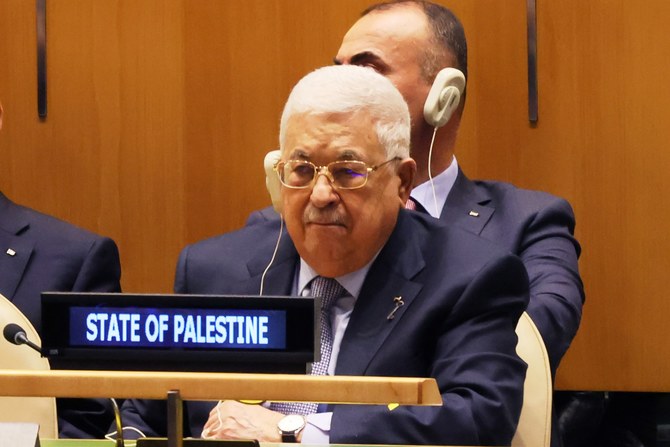Osama Al-Sharif
Since the biggest Palestinian rift in modern times took place in 2007, when Hamas fighters expelled the Palestinian Authority from Gaza and defeated Fatah loyalists in a bloody coup, there have been many attempts at restoring national unity and what the mainstream now calls “Palestinian reconciliation.” But for the generation of Palestinians born after that catastrophic event, Palestinian reconciliation rings hollow. The bitter truth is that, after more than 16 years of political split between Gaza and the West Bank, achieving national unity has become an issue almost as central, and as elusive, as ending the Israeli occupation.
Unlike his predecessor Yasser Arafat, Mahmoud Abbas, who was elected as president of the PA in 2005 in addition to the Palestine Liberation Organization – the latter being the political umbrella for the most active and influential Palestinian factions – was never a popular or charismatic leader. His career has been described as clerical rather than him being a fighter in the trenches. He takes credit for negotiating the Oslo Accords of 1993 and ideologically, or so it seems, he has committed himself to their outcomes despite the fundamental and acute shifts in the inclinations of the Israeli body politic since the year 2000 and even before.
Fatah, the oldest and most popular Palestinian faction, has never been able to recognize Hamas and the other Islamist militant groups, with their extremist agendas, as equals or even as players on the evolving Palestinian political tapestry. While a politically opportunistic Arafat opted to cajole the budding Gaza-based movement of Hamas, especially after the First Intifada of 1988, Abbas disagreed with its objectives and goals. He flatly rejected their militant approach, describing the primitive missiles they then fired at southern Israel as “absurd” or “futile.” Then came the split in Gaza after the collapse of the elected government of Hamas’ Ismail Haniyeh in 2007. The loss of Gaza was an especially painful blow to the PA, which presented itself as the legitimate government of the Palestinians in the Occupied Territories, negotiating a two-state solution and the creation of an independent Palestinian state as per Oslo.
Hamas, and later Islamic Jihad, opted for a more radical position than that taken by the PLO and its institutions, which was a negotiated peaceful settlement. They adopted armed struggle as a way to liberate Palestine. Their influence would have been limited if not for four factors: The failure of all attempts at restoring Palestinian national unity; the paralysis of peace talks between the Israelis and the PA; the rise of an intransigent Israeli far right that openly declared its rejection of the two-state solution and its intention to annex most of the West Bank; and the changing regional geopolitical landscape, which allowed Iran to infiltrate these movements under the guise of confronting Israel and standing in solidarity with the Palestinians. All this was happening while successive Israeli governments carried out a number of military operations against the blockaded Gaza Strip, with the failed aim of crushing the Islamist resistance. While Abbas and his PA stood still as Israel expanded the illegal settlements in the West Bank and East Jerusalem and as the international community paid lip service to condemning the Israeli actions, the popularity of Hamas and Islamic Jihad soared.
Since the 2007 rift, there have been a number of attempts to restore national unity. From the Makkah agreement of 2007 all the way to the most recent reconciliation attempt in Algeria in October 2022, all efforts to form a national unity government, end Hamas’ control of Gaza and hold national elections across the Palestinian territories have been met with failure. The latest initiative, launched by President Abbas, to hold a meeting of the leaders of the Palestinian factions in Egypt, which took place on Sunday, was equally unsuccessful. While Hamas attended, Islamic Jihad boycotted the meeting, calling on Abbas to release the “resistance fighters” who had been rounded up by the PA following Israel’s bloody Jenin incursion last month. The meeting at El-Alamein failed to agree on a joint statement. The rift has widened, with Abbas calling for peaceful resistance to the Israeli occupation and a commitment to international law, while Hamas and others urged him to call an end to the Oslo process and agree on all forms of resistance available to the Palestinians to rid themselves of the Israeli occupation. There was a symbolic, but empty, gesture of agreeing on the need to revive the PLO and to take a united stand.
Abbas, at 87, and the financially troubled PA are running out of options. The Israeli government has turned its back on Oslo and is bulldozing its way into Palestinians lands. It could soon impose Israeli law on more than 60 percent of West Bank territory – a de facto annexation. The Biden administration will not risk a confrontation with Israel over Abbas and the PA ahead of an election year. Hamas and Islamic Jihad appear emboldened by the fact that Abbas is weak and is looking for ways to evade the ultimate question of who will succeed him. And while the heads of more than 10 Palestinian factions were meeting in Egypt on Sunday, fighting broke out between Fatah and “extremist groups” in the Ain Al-Hilweh Palestinian refugee camp in Lebanon. It was the most serious inter-Palestinian fighting in Lebanon in years. This is a bad omen for what may come soon. Lebanese Prime Minister Najib Mikati described the timing of the fighting as “suspicious.” Palestinian reconciliation has become an empty rhetorical statement. Hamas, which is becoming unpopular in the beleaguered Gaza Strip, will not give up control. Abbas is reluctant to allow the holding of elections because the militants may win, as younger and more desperate Palestinians become more skeptical about the prospect of a peaceful settlement that will liberate them. He has become hostage to his obsolete ideological beliefs, all while the PA has become an instrument of normalizing Israeli occupation.
For now, a far-right Israel is benefiting from Palestinian divisions. But Abbas will not last forever and Fatah, his political base, is crumbling under his feet. A new generation of Palestinian leadership is likely to emerge. And as Israel ups the ante, the Palestinian response will surely come.
Arab News







